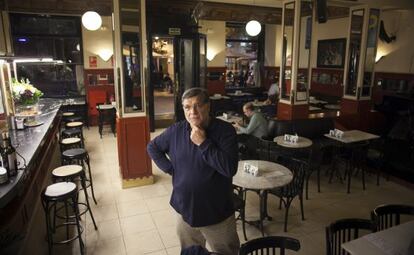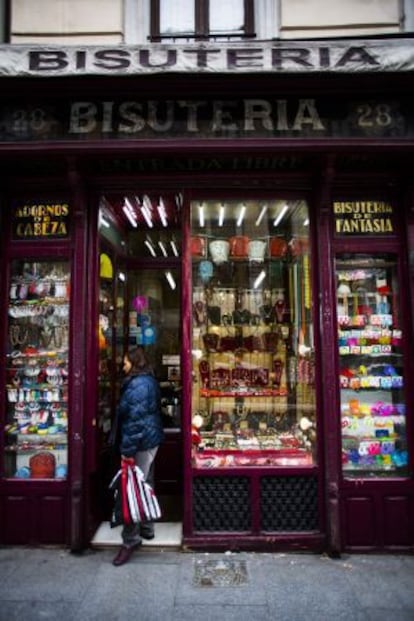Thousands of traditional businesses facing closure as Boyer rent law ends
Up to 250,000 stores and bars could shut once landlords are free to hike charges by 1,000%

The face of many Spanish cities could change drastically from the start of next year when close to a quarter of a million stores, bars and restaurants will face closure after their rent increases by more than 1,000 percent, says UPTA, which represents the country’s self-employed workers and professionals.
The latest blow to a sector already struggling with a five-year-long crisis that has seen sales fall steadily, as well as tougher competition from chains and online stores, comes on December 31 when the so-called Boyer law ends. Dating from 1994, the legislation exempted establishments with lease agreements prior to 1985 from rent increases; once gone, owners will be free to impose new terms.
In Madrid, around 38,500 establishments are under threat. The result, believes Gerardo Pérez, one of the four founders of leading Madrid small jazz venue Café Central, will be multinational franchises moving in to take over inner city premises. “Our cities are losing their identity; soon it won’t make any difference if you’re in Paris, Berlin, or Madrid. They will all be the same: filled with big name food and clothes stores,” he says.

Almudena Zarco, the granddaughter of the founder of the 110-year-old Bisutería Otero, one of Madrid’s oldest surviving jewelers, agrees: “This is very sad, and not just for me. Madrid will lose out, because the tourists will stop coming if we lose the character of our city.”
The rent hike will also mean the loss of more jobs. “My eight employees are part of my family,” says Pepa Eznarriaga, who, along with her three brothers, runs the Así doll and soft-toys shop on Madrid’s Gran Vía. Once home to cafés and the city’s big movie theaters, Gran Vía has in recent years been taken over by fashion stores such as H&M and Zara.
Zarco agrees: “Even the most recent [staff members] joined five years ago. They all have proper contracts, not like the people who will work in the stores that come after us: souvenir shops, fast food restaurants or pawnbrokers. That’s not creating jobs.”
The majority of store owners understand that the owners of the properties they lease want to make as much money as they can and that the rents they pay are way below market price. But they think the Madrid regional government and City Hall should have taken a case-by-case approach. Eznarriaga, for example, points out that his is a family business, but his contract is in the name of a company: “If I had signed it in my name, then we wouldn’t have to renegotiate until I retired or died,” he says.
A stroll around the center of Madrid shows the impact of the coming law change, with a growing number of establishments closing down. Hernando, on number 71 Gran Vía, has been making shirts for more than 80 years: “We’ve seen the fall of the monarchy, the dictatorship, the republic, civil war, more dictatorship, and finally democracy,” says Ángel García, who has worked in the store for more than seven decades.
He prefers not to reveal how much rent he now pays, but says the owner wants an 800-percent increase. That’s probably similar to the €50,000 a month that the owner of the Así soft toys shop at the other end of Gran Vía is asking. Others, such as the Rústica interior design store, have already moved on – in its case from Calle San Bernardino, a narrow street running from the back of Plaza España. “The saddest part of the whole thing was seeing the desk where I have worked for the last years being moved,” says store owner Catherine Tual.
30,000 sign petition to save Madrid’s Café Central
Over the course of its 32-year life, the Café Central has come close to shutting down on more than one occasion. Despite being named one of Europe's top 10 jazz clubs by British music magazine Wire in 1991, it ran into financial problems, which were temporarily solved by Barcelona-based pianist Tete Montoliu, who gave a series of concerts for free in the summer of 1994.
“We don’t have a plan B, and the four of us who founded the club and still run it are too old to find other work,” says Gerardo Pérez, adding that the Central’s staff of 35 will also be made unemployed.
Pérez says he is not prepared to negotiate with the leaseholder, and he and his partners plan to take legal action to delay closure. Online activism site Change.org has organized a petition that has so far collected 30,000 signatures.
Back in 1982, the Central’s rent was €480 a month. That figure has since risen to €5,000. “We have never had a peppercorn rent, and we have never thought about buying the place, because we don’t have the money,” says Pérez. “Some people think that we have made a fortune out of the place; I just wish they were right,” he says.
Tu suscripción se está usando en otro dispositivo
¿Quieres añadir otro usuario a tu suscripción?
Si continúas leyendo en este dispositivo, no se podrá leer en el otro.
FlechaTu suscripción se está usando en otro dispositivo y solo puedes acceder a EL PAÍS desde un dispositivo a la vez.
Si quieres compartir tu cuenta, cambia tu suscripción a la modalidad Premium, así podrás añadir otro usuario. Cada uno accederá con su propia cuenta de email, lo que os permitirá personalizar vuestra experiencia en EL PAÍS.
¿Tienes una suscripción de empresa? Accede aquí para contratar más cuentas.
En el caso de no saber quién está usando tu cuenta, te recomendamos cambiar tu contraseña aquí.
Si decides continuar compartiendo tu cuenta, este mensaje se mostrará en tu dispositivo y en el de la otra persona que está usando tu cuenta de forma indefinida, afectando a tu experiencia de lectura. Puedes consultar aquí los términos y condiciones de la suscripción digital.








































